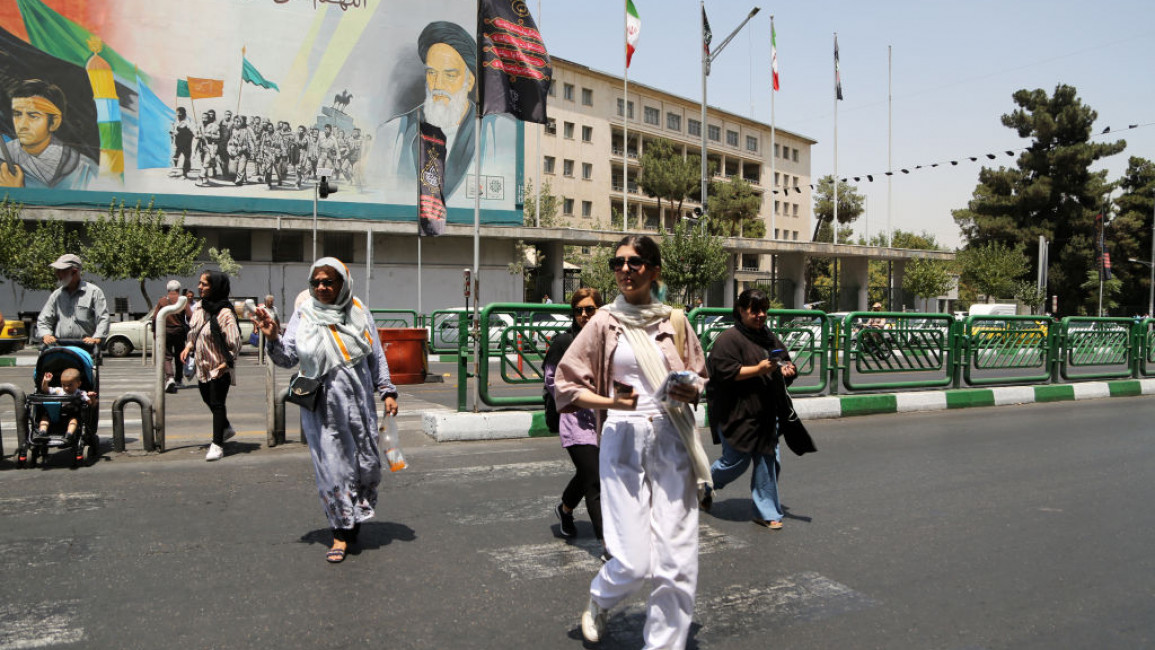Iranian authorities refer women defying hijab law to psychiatric hospitals and funeral centres
Iranian authorities and the judiciary system have ramped up their confrontation against women who defy the obligatory Islamic hijab law by penalties including washing the bodies of the deceased in funeral centres and requiring women to obtain a mental health certificate from psychiatric hospitals.
As Iranian police relaunched patrols similar to the Islamic morality police, locally known as Gasht-e Ershad, recent court orders against women who defied the Islamic dress code were made public, and high-ranking officials went so far as to accuse these women of suffering from mental health problems.
The confrontation between the authorities and citizens came to the forefront following the death of Mahsa Amini, 22, while in the custody of the morality police. Subsequently, the morality police patrols were temporarily withdrawn from the major cities.
However, with the recent return of the Islamic morality police to the streets, the situation has worsened.
In one of the latest moves to suppress women's resistance against the hijab law Ayatollah Ahmad Khatami, a powerful clergy, made headlines with his strong remarks against women who defy the law.
During a Friday prayer sermon in Tehran, he labelled those women as "sick" and added: "The woman who goes on the streets without the hijab is sick. We should not slap her but cure her with kindness".
Khatami's remarks came a few days after the court ordered two Iranian actresses, Afsaneh Baigan and Azadeh Samadi, to go to the mental health centres routinely.
Judges who prescribe treatment for 'mental health issues'
The judiciary system did not shy away from using the same labels and prescribing treatment for what they consider "mental health issues."
On July 19, actress Afsaneh Baigan was sentenced to a two-year prison term and banned from leaving the country or using social media platforms due to her appearance in public without a head cover.
The prison sentence was suspended, but Baigan was ordered to undergo psychological treatment to rectify what the court deemed "anti-family characteristics." At the end of the treatment period, she must provide a mental health certificate to the court.
Another actress, Azadeh Samadi, faced similar accusations and received a comparable punishment from Iran's judicial system, run by hardline Islamic clergies. The court banned her from using the internet for six months and required her to attend mental health treatment every two weeks because of having 'anti-social characteristics'.
Like Baigan, Samadi was also mandated to produce a mental health certificate after treatment.
These court rulings triggered outrage among cinema artists, while Iranian lawyers and mental health care professionals challenged the verdicts. Critics argued that judges were not qualified to diagnose mental health issues and should leave such assessments to psychologists.
Samadi's lawyer called the court order a "political statement". At the same time, Baigan's attorney said that his client's court order was "the judge's personal opinion", stressing that only "psychologists can diagnose mental issues, not judges".
In response to the controversy, four psychology organisations wrote an open letter to Iran's chief justice, Gholam Hossein Mohseni Ejei, denouncing the judiciary's approach. They drew attention to historical parallels where labelling dissidents as people with a mental health conditions was used as a means of control, such as during slavery in the US and the Soviet Union.
"The term' anti-family characteristics' used in one of the court orders is a non-scientific and rare phrase that the experts cannot even believe someone has used," the letter added.
Forced labour to enforce hijab law
The judiciary's harsh rulings extend beyond celebrities and target ordinary women. In one case, a woman accused of defying the hijab law while driving a car was sentenced to one month of forced labour at Varamin's funeral centre, where she was required to wash the bodies of the deceased as a "public service."
According to Islamic tradition, the deceased's body will be washed before burial.
Similar forced labour punishments have been applied to other women, including a doctor who was banned from working in the public sector, "specifically public health centres," and was sentenced to work as a janitor for a month.
Another woman faced a similar fate and was handed a punishing sentence of 270 hours of work as a cleaning lady in a governmental office responsible for shutting down businesses that serve people without the Islamic hijab.
The verdict for her case included a statement demonstrating the authorities' view about citizens' personal choice and expression: "Adhering to the hijab law will safeguard society from sexual promiscuity while defying it will lead society towards sexual corruption."



